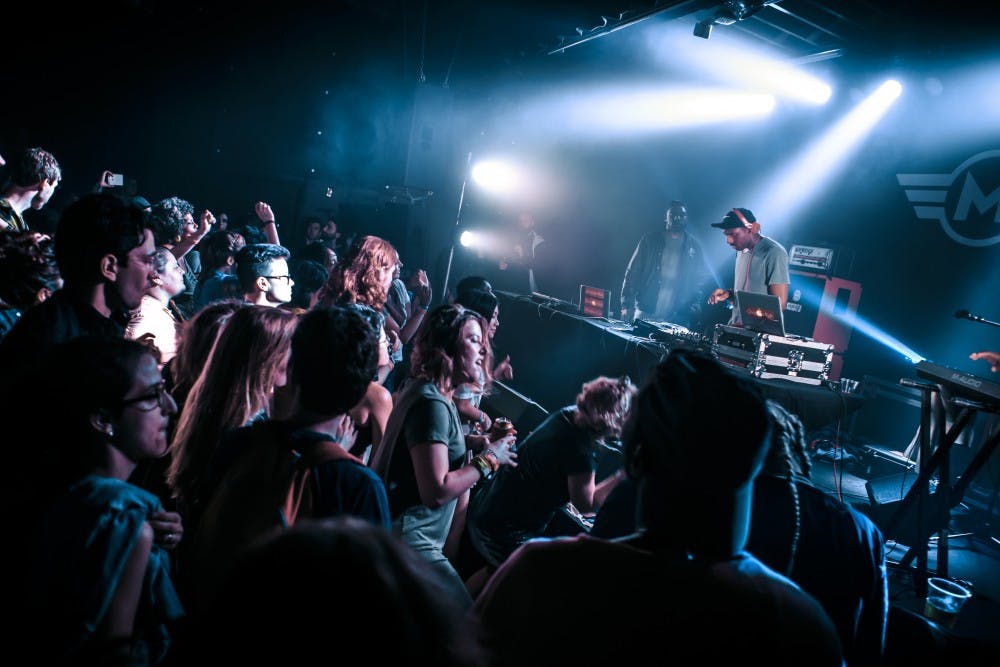“One doesn’t hear much talk of synthesizers here,” the electronic music pioneer Robert Moog said of western North Carolina, shortly after moving there in 1977. Coming from the urban bustle of New York City, this was a major change of scenery for the inventor—one that, to his estimation, enabled him to better understand the electronic music scene from the outside in.
Forty years later, this rural, Southern state is no longer on the outside of that scene. A celebration of all the innovation Moog stood for in the fields of music and technology, Moogfest will come back to downtown Durham for the second year May 18 to May 21. Beginning as a mere one-night event in New York over a decade ago, the now expanded festival moved to Asheville in 2010 before breaking ground in Durham last year. Equal parts music festival and technology symposium, Moogfest bills itself as the synthesis of art, music and technology, bringing a wide field of talent centered on a theme of futurism both in sound and in thought.
The intersection of art and technology displayed at Moogfest is a somewhat unusual one, eschewing the lineup spectacle of more conventional music festivals. In Durham, however, where a vibrant arts community interacts with the innovation of the Research Triangle, the balance makes perfect sense.
“All human activity is interconnected, all of it shapes and is shaped by the decisions we make and what we choose to create,” Creative Director Emmy Parker wrote in an email. “Through a program featuring cutting edge music and technology presentations, Moogfest participants realize that these things don’t exist in a vacuum or purely for entertainment.”
For its second year in the area, Moogfest has continued to partner with local organizations to set up its programming, including the LGBTQ Center of Durham, the American Underground, Blackspace and Art of Cool (which hosts its own festival next week).
Music fans will recognize the bigger names on Moogfest’s lineup, whose headliners include Flying Lotus, Animal Collective and Talib Kweli, along with an art exhibit from former R.E.M. frontman Michael Stipe. But it is the daytime programming—a mix of lectures, synth-building workshops and discussions—that sets the festival apart from others like it. With the collective talent of three research universities in close proximity, the festival has used Durham’s location to its benefit: Duke professors, in fact, make a significant contribution to Moogfest’s lineup.
Scott Lindroth, music professor and vice provost for the arts at Duke, is one of those professors, conducting sessions at Durham’s Carolina Theatre that highlight his work with the powerful composition programming language SuperCollider. His involvement at this year’s festival began a few years ago, when he discovered scrap metal at a recycling center. Intrigued by the metal’s resonant quality, he set out to make instruments out of them. After collaboration with live percussionists and hours of trial-and-error spent in his garage workshop during summers, he finished what he calls an “ensemble of found metals.” The mechanism—which makes use of screwdrivers as mallets—uses a programmed algorithm to compose the striking of the metals, taking inspiration from the biological rhythms of fireflies’ flashes.
To Lindroth, Moogfest represents a fascination with the naturalistic aspect of music that too often is lost in a digital world, even as it celebrates the leaps and bounds that technology has made.
“It’s a real celebration of analog synthesizers and having really interesting hardware, which creates a very different workflow: it’s much more hands-on, it’s much more tactile,” Lindroth said. “It goes along with a whole renewed interest in a kind of materiality of sound—that’s why I didn’t want to synthesize music; I wanted to use actual objects and physical objects and play those as the basis for this project.”
On the non-musical side of Moogfest’s programming, Duke professors Katherine Hayles and Mark Kruse will lead a panel based on a course they teach together titled “Science Fiction/Science Fact.” A popular class that nearly always fills up quickly after course registration begins, “Science Fiction/Science Fact” brings together the worlds of literary criticism and science in an examination of how scientific inquiry in fields like quantum mechanics is represented in science fiction literature.
In addition, Kruse will lead workshops analyzing data from the Large Hadron Collider, another example of the festival’s extension into science.
“The idea that you can intervene in some way, and you can discover new things through your intervention—I think it’s a strong point of commonality between the technological themes and between technology and music," Hayles said.
Kruse added: “In some sense, we try to test nature by intervening with it and sort of poking at it and see[ing] how it responds. And that’s similar to what music is doing.”
That spirit of intervention is perhaps what ties the diverse elements of Moogfest together. Parker acknowledged that the festival still has a long way to go in fully integrating with Durham’s community, but the festival has expanded its boundaries, taking advantage of the arts and innovation surrounding it.
“It’s Moogfest’s good fortune to be immersed in this powerful and diverse community of thinkers and doers,” Parker wrote. “It’s easy to see that something special is happening in Durham right now and we are lucky to be caught up in the mix.”
Moogfest runs May 18–21 in downtown Durham. For the full lineup and information about tickets and volunteering, including student discounts, visit moogfest.com.
Get The Chronicle straight to your inbox
Signup for our weekly newsletter. Cancel at any time.

